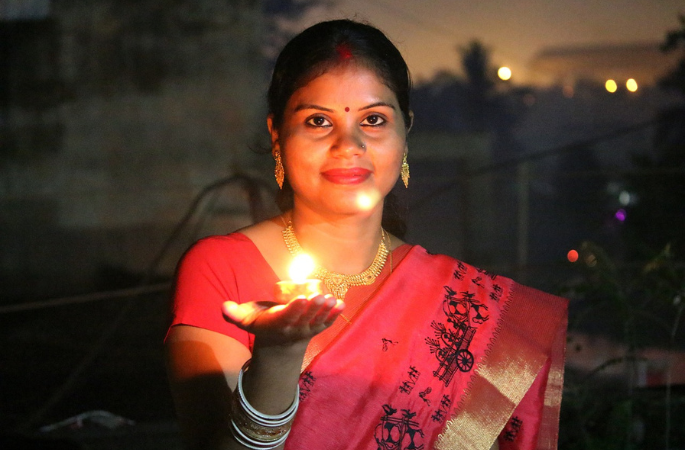As soon as October arrives, the remarkable diversity of Indian culture can be seen through a plethora of festivals celebrated differently across the country. Most of us are thrilled for this festive season to begin so that we may meet our friends and family, have fun and enjoy our vacations; however, we often tend to overlook the household work that increases for a woman. We already have strict notions about who a ‘modern sanskari bahu’ is, a woman who is pursuing her job while also taking care of her children and doing most of the domestic chores. The same trope has been portrayed in several prominent Indian television shows and films too.

A woman is always judged based on how efficiently she can manage the home. My mom’s day starts with watering and pruning the plants.
Even when a woman is employed, I have observed that the most common question for marriage from the groom’s family is whether she can ‘handle’ the house or not. This leads to gendered notions of work and division of spaces within the home. While most men enjoy these holidays, women end up spending most of their time in the kitchen, cooking various dishes and serving the family and guests. Along with that, they also have the responsibility of cleaning the whole house and decorating it for the festivities. Furthermore, if they areemployed, they must handle all of this in addition to their office work.
My mother, a teacher in a government school, has been in service for the last 32 years. For the 25 years of my life, I’ve watched her manage everything, from her profession to us to our house. I have also noticed that when it comes to women’s work, everyone has an opinion on how it ought to be done rather than giving a helping hand or dividing the work. For how long will this relationship between a woman and household chores be considered natural and inevitable?

Even if she is sometimes late for work, she makes sure that she mops every part of the house that the maid didn’t do properly. There is no space for relaxation in her life.
Among women, one of the most common reasons given for quitting their job is because they cannot handle both office work and household work together. A lot of guilt-tripping also comes from the extended family when women choose to work outside the home, and thus, most of them end up juggling both at the cost of their mental and physical health. Most of us do not even acknowledge the colossal amount of work done by women in our families during the festive season.

My mom gets ready for work before we even know it. But because she loves her hair for a long time, she makes sure to comb it properly.

After ensuring that everything is in place at home, she leaves for school.
These exhausting and time-consuming household activities take up most of their holiday; nevertheless, they are considered unproductive! “What did you do the entire day,” is what they get to hear instead. Since working mothers get a limited number of holidays during festivals, they choose to work all day long which in turn adversely affects their health.
Because my father has an outstation job and only visits on weekends, my mother is responsible for cleaning the house and preparing sweets and refreshments for the main days of the festival. She gets up before everyone in the house and starts her work from 6 a.m. onwards, as she works relentlessly in the garden and prepares lunch for the four of us until 10 a.m., after which she gets ready to leave for work. Nowadays, she cleans one room every day once she returns home. While doing all of this, she hardly ensures to eat enough and occasionally skips lunch. And it doesn’t end there. Apart from that, she also has to do the daily ‘routine’ that includes making sure that all the clothes in the house are clean and finishing her work from school. And when we retire for the day without worrying about the next day’s meal and an unending list of chores, she is often the last one to sleep. Why does she have to be responsible for everything in the house?

After returning from the office and resting for some time, her yearly deep cleaning of the house during the festive season begins. This usually takes around 3-4 hours of extra labour from her 30 hours/day clock.
Our society tends to categorise women into two boxes, either one who sacrifices her aspirations (even if she is working) or the one who alienates herself from household work and eventually society. This thought process is constantly pushed forward by social conventions and popular culture. From movies and TV ads to soap operas like Anupama, Indian popular culture has presented women who take care of their home and manage their jobs simultaneouslyas strong female figures, which has led to their denial of individuality. We have forgotten to look at them as persons with their own identities.

On the eve of Dussehra, her morning was spent cleaning the vehicles and then later; she decided to use the entire holiday for other chores. This also involved her making Kheer-Pakora along with the usual dinner.

My mother hardly watches television but makes sure she doesn’t miss her favourite drama series.
If they make mistakes, they are looked down upon and criticised for not properly taking care of the house. They are questioned for their ‘sanskars’ [traditional social values and skills] On several occasions, they are asked, “Is this what your mother taught you?” This culture of rewarding the selfless caregiver has resulted in an unwarranted pedestalisation of the woman who is engaged in immoderate domestic chores, ignoring the fact that she, like everyone else in the family, is human, has her own needs, and is also capable of making mistakes. If there are any classifications, they are based on a continuum of experience, mistakes, love, and personality rather than on the extreme ends.

Sometimes she is lost in her own thoughts while doing chores. Maybe this is a small escape she has discovered to think about things beyond the home.
As we work towards making this world a better place, it is critical to talk about womanhood through an intersectional lens. If every family member does their basic part and tries sharing the load, women will have better lives. My family is certainly not perfect, but with time, we have come to the realisation that endless household work should be shared by offering helping hands to our mother.
Household work should be treated like any other group project where everyone has assigned tasks and should not end up where one person is doing too much work. This inequality within the household has to be addressed. After all, every woman should have the freedom to approach her professional and personal life in the way she deems fit.



